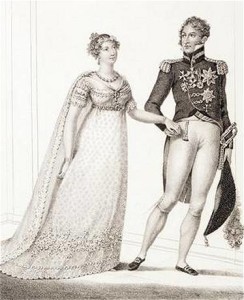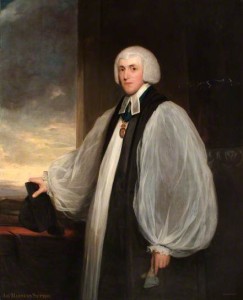by Donna Hatch
www.donnahatch.com
English marriage, and the methods in which one could place one's neck in the "parson's noose," underwent a number of changes just prior to the Regency, and they changed again during the Victorian Era. Though a Special License appears frequently in romance novels, during the Regency Era, it was issued rarely, and only under extenuating circumstances.
www.donnahatch.com
English marriage, and the methods in which one could place one's neck in the "parson's noose," underwent a number of changes just prior to the Regency, and they changed again during the Victorian Era. Though a Special License appears frequently in romance novels, during the Regency Era, it was issued rarely, and only under extenuating circumstances.
During the Regency, the most common way to get married (especially among the humbler classes) was to have the banns posted also called "putting up the banns." This required posting on the wall of the church and read by the clergy from the pulpit of both the bride and the groom's parish for three consecutive Sundays in order to give the public a chance to object to the marriage. After that, couple could get married within 90 days, and the wedding must take place between 8 in the morning and noon in the husband or wife's parish of Church of England, even if the couple were Catholic. Quakers and Jews were exempt, apparently.
A couple wishing to marry could also do so by ordinary license. This did not require putting up the banns, but it cost money--not much, but it wasn't free, and it had many of the same restrictions of marriage by banns.
Marriage by special license was different. The advantages of having a special license were that a couple could marry any time and place that they wished. When applying for a special license, certain criteria must be met. First of all, few outside of titled lords and their spouses and children were eligible, and one seeking such privilege must go appeal to His Grace, the Archbishop of Canterbury.
According to noted researcher and novelist, Susanna Ives:
"BY the Statute of 23 Hen. VIII., the Archbishop of Canterbury has power to grant Special Licences; but in a certain sense these are limited. His Grace restricts his authority to Peers and Peeresses in their own right, to their sons and daughters, to Dowager Peeresses, to Privy Councillors, to Judges of the Courts at Westminster, to Baronets and Knights, and to Members of Parliament ; and by an order of a former Prelate, to no other person is a special licence to be given, unless they allege very strong and weighty reasons for such indulgence, arising from particular circumstances of the case, and they must prove the truth of the same to the satisfaction of the Archbishop."
"In the case where the parties applying do not rank within the restricted indulgences, a personal interview should be sought, or a letter of introduction to his Grace should be obtained, containing the reasons for wishing the favour granted. Should his Grace grant his fiat, in either case the gentleman attends his proctor to make the usual affidavit, that there is no impediment to the marriage—the same as in an ordinary licence."
When applying for a special license, both the bride and groom must be named so the Archbishop of Canterbury could verify their eligibility to wed. Since those who could use a special license were all members of the upper class, and since the archbishop sat in the House of Lords, His Grace probably knew most of them. Regardless, he would not have issued a license without verifying their eligibility to wed.
Also, a special license cost quite a bit more than a regular marriage license. However, a special license allowed a couple to marry in any location and at any time. It also made the posting the banns unnecessary, so if there were some reason a couple wanted to marry in haste, or didn't want to subject themselves to public protestation, this allowed a way to do it.
Remember, though, that obtaining special license was dependent on the Archbishop of Canterbury's decree and goodwill. His Grace didn't grant Special Licenses frequently nor lightly.
More information about the different methods available to the Regency couple wishing to marry can be found here.
Sources:
http://www.regencyresearcher.com/pages/marriage.html


No comments:
Post a Comment